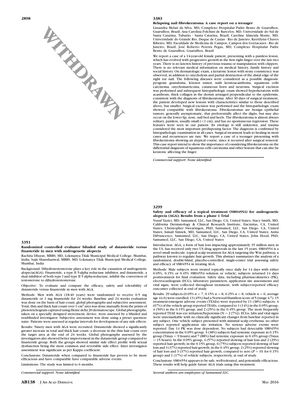TLDR Dutasteride works better than finasteride for hair growth with similar side effects.
The study compared the efficacy, safety, and tolerability of dutasteride and finasteride in treating androgenetic alopecia (AGA) in 90 men aged 18-40 over 24 weeks. Dutasteride showed a significantly greater increase in total and thick hair count and a decrease in thin hair count compared to finasteride. Both treatments had similar side effect profiles, with sexual dysfunction being the most common and reversible side effect. The study concluded that dutasteride was more efficacious than finasteride with comparable adverse events, though it was limited to a 6-month duration.
 1 citations
,
March 2023 in “Scientific Reports”
1 citations
,
March 2023 in “Scientific Reports” Finasteride may increase the risk of suicide or severe self-harm in men with mood disorders but not in the general population.
 23 citations
,
October 2018 in “Expert Opinion on Drug Safety”
23 citations
,
October 2018 in “Expert Opinion on Drug Safety” Consider benefits and risks of new alopecia treatments for safety.
 June 2024 in “Georgetown medical review”
June 2024 in “Georgetown medical review” Finasteride treats hair loss but may cause low libido, erectile issues, and depression.
 57 citations
,
July 2016 in “The Journal of Sexual Medicine”
57 citations
,
July 2016 in “The Journal of Sexual Medicine” 5α-reductase inhibitors increase the risk of sexual dysfunction, especially in men with enlarged prostate.
 31 citations
,
January 2017 in “Advances in Experimental Medicine and Biology”
31 citations
,
January 2017 in “Advances in Experimental Medicine and Biology” Low testosterone and 5α-reductase inhibitors can harm men's metabolic and sexual health; testosterone therapy may help, but discussing 5α-RIs' side effects is important.
 35 citations
,
April 2013 in “Sexual medicine reviews”
35 citations
,
April 2013 in “Sexual medicine reviews” 5-alpha reductase inhibitors slightly increase the risk of sexual and mood side effects, and breast growth in men.






